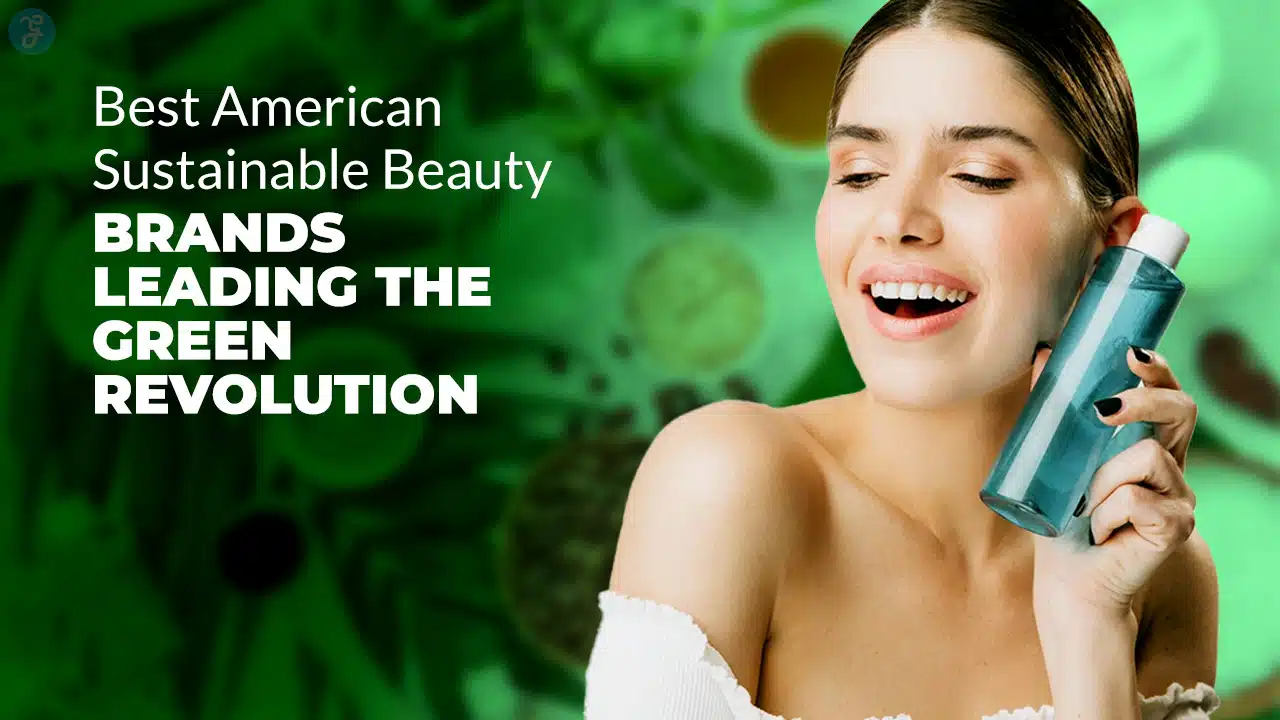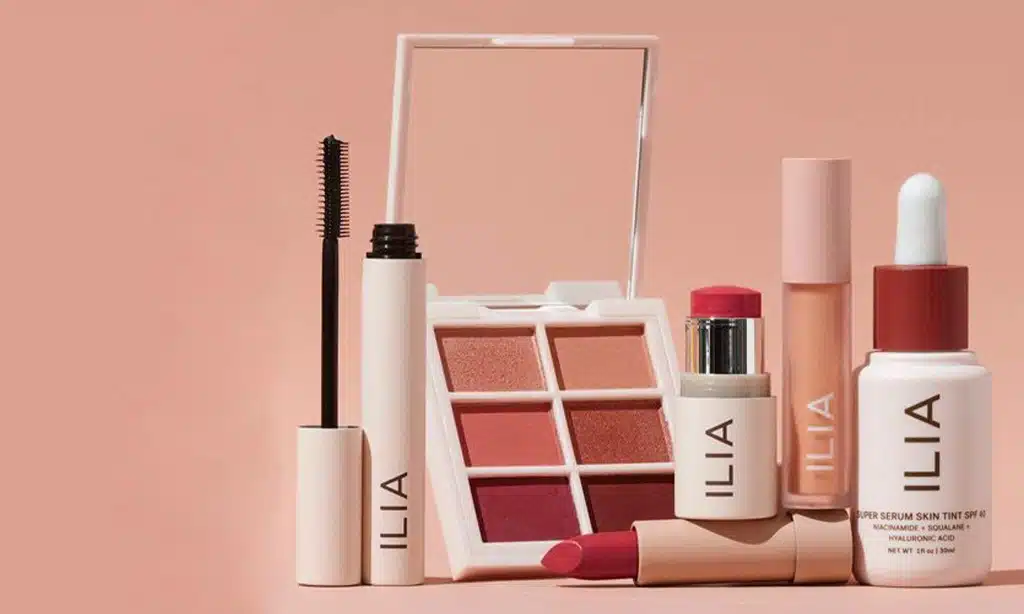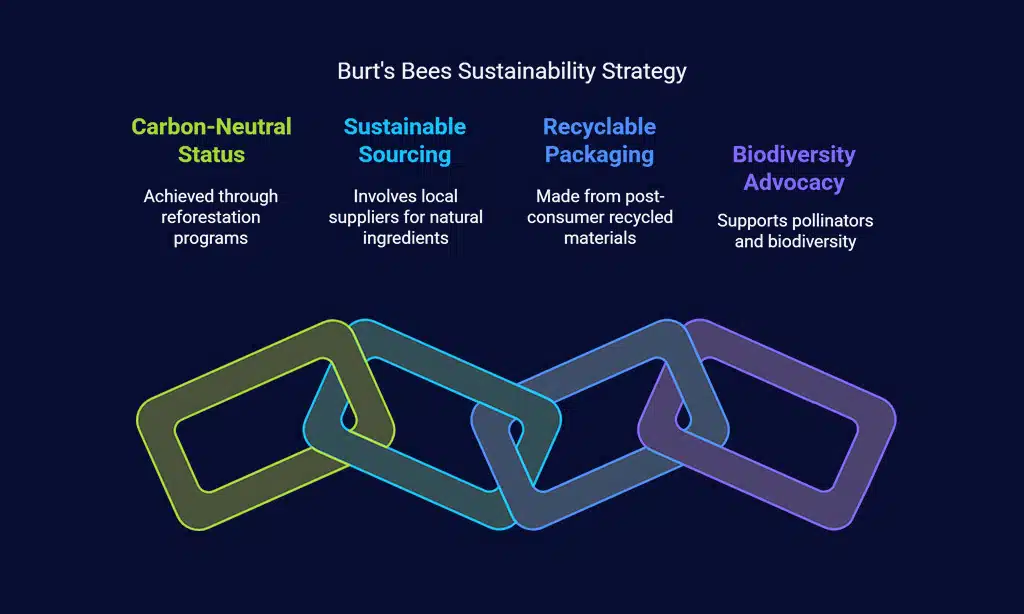The beauty industry is experiencing a significant shift toward sustainability as consumers demand products that are both effective and environmentally responsible. From clean ingredients to eco-friendly packaging, American sustainable beauty brands are at the forefront of this change.
These brands are not just creating beauty products—they are leading a green revolution that focuses on making the beauty industry more ethical, eco-conscious, and aligned with the values of today’s conscious consumers.
In this article, we explore the 10 Best American Sustainable Beauty Brands Leading the Green Revolution, highlighting their commitment to sustainability, ethical sourcing, and eco-friendly innovations. These brands are setting new standards for beauty while helping reduce the environmental impact of the beauty industry.
Introduction to Sustainable Beauty in America
Sustainable beauty refers to beauty products that are designed with both personal care and the environment in mind. The growing awareness of climate change, pollution, and the depletion of natural resources has led consumers to seek out brands that prioritize sustainability.
Beauty companies are responding with greener formulations, ethical sourcing practices, and eco-conscious packaging.
What Makes a Beauty Brand Sustainable?
A truly sustainable beauty brand considers multiple factors to ensure that its products are safe for both consumers and the planet. Sustainable beauty brands typically adhere to the following key principles:
- Ethical Ingredients: Sourcing natural, organic, and non-toxic ingredients from certified, sustainable farms.
- Eco-friendly Packaging: Choosing recyclable, biodegradable, or reusable packaging to reduce waste.
- Cruelty-Free: Ensuring that products and their ingredients are not tested on animals.
- Energy-Efficient Production: Using sustainable energy sources in manufacturing and reducing carbon footprints.
- Fair Trade Practices: Supporting workers with fair wages and working conditions in their supply chain.
By adopting these practices, sustainable beauty brands aim to reduce environmental harm while offering consumers high-quality, eco-friendly alternatives.
The Importance of Sustainability in the Beauty Industry
The beauty industry is a significant contributor to global waste, especially plastic pollution. As beauty products often come in single-use plastic packaging, many brands are turning to more sustainable packaging materials to help mitigate this issue. Additionally, chemical-heavy products can have negative environmental impacts when washed off and run into water systems.
Consumers, especially millennials and Gen Z, are increasingly looking for brands that align with their values. According to a 2021 report from Nielsen, 73% of global consumers say they would definitely or probably change their consumption habits to reduce their environmental impact.
This shift is influencing the beauty market, where sustainability is becoming a key selling point. In response, American Sustainable Beauty Brands Leading the Green Revolution are innovating to meet consumer demand while pushing the industry toward more responsible practices.
Overview of the Green Revolution in Beauty
The green revolution in beauty is much more than just a trend; it’s a cultural shift toward making environmentally responsible decisions across all sectors of the beauty industry.
Brands are increasingly embracing sustainability in their formulations, packaging, sourcing, and production practices. The movement has sparked change not just in smaller, niche brands but also in larger, legacy companies that recognize the need for more sustainable practices. Sustainable beauty is now not only about choosing natural ingredients but also about considering the impact of the entire product lifecycle—from sourcing to disposal.
The Criteria for Selecting the Best Sustainable Beauty Brands
When evaluating the American Sustainable Beauty Brands Leading the Green Revolution, several important factors are taken into account. These include sustainability in packaging, ethical sourcing, carbon footprint reduction, and cruelty-free certifications. Below are the primary criteria that these brands are judged on:
Eco-friendly Packaging
Packaging waste is a major issue in the beauty industry, with many products still packaged in plastic that often ends up in landfills or the ocean. Sustainable beauty brands are stepping up to reduce their packaging waste by adopting recyclable, compostable, or biodegradable packaging materials.
Key Factors for Eco-friendly Packaging:
- Material choice: Using glass, aluminum, or biodegradable plastics.
- Reusability: Packaging that can be refilled or reused multiple times.
- Minimalist designs: Reducing packaging size and unnecessary layers.
Ethical Sourcing and Ingredients
Ethical sourcing refers to the practice of obtaining ingredients from suppliers who respect the environment and the workers who produce them. Sustainable beauty brands prioritize ingredients that are natural, organic, and harvested using eco-friendly methods. Some brands also participate in fair-trade certification, ensuring that farmers receive fair wages.
Key Sourcing Considerations:
- Natural ingredients: Non-toxic and organic, with no harmful chemicals.
- Fair Trade: Supporting farmers and suppliers with ethical business practices.
- Traceability: Transparency in the sourcing process to ensure ingredients are ethically harvested.
Carbon Footprint and Energy Efficiency
Reducing the carbon footprint in beauty product manufacturing is a growing concern. Leading sustainable beauty brands invest in energy-efficient manufacturing processes, adopt renewable energy, and work to offset their emissions through reforestation programs or carbon credits.
Key Considerations for Reducing Carbon Footprint:
- Renewable energy: Solar, wind, and other renewable sources used in production.
- Carbon offset programs: Reducing or offsetting emissions through green initiatives.
- Sustainable logistics: Efficient shipping practices to reduce transportation emissions.
Cruelty-Free and Vegan Certifications
Consumers today are increasingly concerned about animal welfare. Brands that are cruelty-free ensure that their products and ingredients have not been tested on animals. Vegan beauty products are made without animal-derived ingredients such as honey, beeswax, or lanolin, making them suitable for those who follow vegan lifestyles.
Cruelty-Free and Vegan Standards:
- Leaping Bunny: A certification that guarantees no animal testing.
- Vegan Society: Ensures that no animal-derived ingredients are used.
- Peta Certified: Another trusted label for cruelty-free brands.
The 10 Best American Sustainable Beauty Brands Leading the Green Revolution
Now, let’s look at the 10 Best American Sustainable Beauty Brands Leading the Green Revolution. These companies have proven their dedication to sustainability through eco-friendly practices, cruelty-free policies, and ethical ingredient sourcing.
| Rank | Brand Name | Key Sustainable Features |
| 1 | RMS Beauty | Natural ingredients, eco-friendly packaging, non-toxic formulas |
| 2 | Ilia Beauty | Organic ingredients, recyclable packaging, cruelty-free |
| 3 | True Botanicals | 100% natural ingredients, fair trade practices, recyclable packaging |
| 4 | Tata Harper | Sustainable farming, eco-conscious packaging, high-quality natural skincare |
| 5 | Beautycounter | 1,800+ harmful chemicals banned, eco-friendly packaging, ethical sourcing |
| 6 | Herbivore Botanicals | Vegan, cruelty-free, renewable energy in production |
| 7 | Burt’s Bees | Carbon neutral, natural ingredients, sustainable packaging |
| 8 | Youth to the People | Vegan, organic ingredients, glass packaging, carbon-neutral shipping |
| 9 | Kjaer Weis | Refillable luxury makeup packaging, organic ingredients |
| 10 | Alima Pure | Eco-friendly, cruelty-free, minimal packaging, toxin-free makeup |
1. RMS Beauty
RMS Beauty is a frontrunner in the clean beauty movement, offering products made from natural, organic ingredients. Their formulations are free from harmful chemicals such as parabens, sulfates, and synthetic fragrances. RMS Beauty also uses eco-friendly packaging made from recyclable and reusable materials.
Sustainability Highlights:
- Uses only organic ingredients, including fair-trade oils and butters.
- Glass and aluminum packaging to reduce plastic waste.
- Refillable options available for certain products.
2. Ilia Beauty
Ilia Beauty is committed to making clean beauty products that are both effective and eco-friendly. They focus on organic ingredients and recyclable packaging. Their products are vegan and cruelty-free, with a commitment to being transparent about sourcing and ingredients.
Sustainability Highlights:
- 100% recyclable packaging and compostable cartons.
- Eco-friendly manufacturing processes that reduce their carbon footprint.
- Donations to environmental causes and carbon offset programs.
3. True Botanicals
True Botanicals stands out for its commitment to natural, non-toxic skincare. Their products are sustainably sourced and feature high-quality ingredients from regenerative farming practices. True Botanicals’ packaging is recyclable, and they are a certified B Corp, which means they meet rigorous standards of social and environmental performance.
Sustainability Highlights:
- Ingredients sourced from fair-trade and organic farms.
- Fully recyclable glass packaging.
- Carbon-neutral shipping and packaging materials.
4. Tata Harper
Tata Harper is renowned for its luxurious skincare products made with 100% natural ingredients. They emphasize sustainable farming practices, where ingredients are harvested using eco-conscious methods. Their packaging is made of recyclable glass, and the brand actively works to reduce its overall carbon footprint.
Sustainability Highlights:
- All products are formulated with natural, non-toxic ingredients.
- Packaging made from recyclable glass and recyclable outer cartons.
- Carbon-neutral production processes and commitment to regenerative agriculture.
5. Beautycounter
Beautycounter has become synonymous with clean beauty, offering products free from over 1,800 harmful chemicals. The brand emphasizes transparency in ingredient sourcing and prioritizes eco-friendly, recyclable packaging. Beautycounter is also committed to activism in pushing for stricter regulations in the beauty industry.
Sustainability Highlights:
- Bans over 1,800 harmful chemicals from products.
- Uses recyclable packaging and minimal plastic.
- Advocates for stricter environmental regulations in the beauty industry.
6. Herbivore Botanicals
Herbivore Botanicals is a brand committed to creating products that are not only effective but also sustainable. Their products are made using plant-based, natural ingredients, and they prioritize sustainability in every aspect of their production, from formulation to packaging. The brand uses renewable energy in its manufacturing processes and is a strong advocate for eco-friendly practices in the beauty industry.
Sustainability Highlights:
- Vegan and cruelty-free formulations with no synthetic ingredients.
- All packaging is either recyclable, reusable, or made from biodegradable materials.
- A strong commitment to renewable energy in the production process.
- Actively supports environmental conservation initiatives.
7. Burt’s Bees
Burt’s Bees has long been a beloved brand for those seeking natural and eco-friendly skincare solutions. With over 30 years in the industry, Burt’s Bees has established itself as a leader in sustainable beauty. The brand emphasizes reducing its carbon footprint and has achieved carbon-neutral status across its operations. Their ingredients are natural, sustainably sourced, and often from small, local suppliers.
Sustainability Highlights:
- Certified carbon-neutral company, meaning they offset their emissions through reforestation programs.
- Uses sustainable sourcing practices for natural ingredients like beeswax and essential oils.
- Packaging made from recyclable and post-consumer recycled materials.
- Advocates for biodiversity and supports pollinator-friendly practices.
8. Youth to the People
Youth to the People is a skincare brand that blends superfoods with eco-conscious practices. Their approach to sustainability extends beyond their ingredients, as they focus on using renewable energy in their production processes and prioritize reusable glass packaging. Their products are vegan, cruelty-free, and packed with antioxidant-rich ingredients sourced sustainably.
Sustainability Highlights:
- Glass packaging that is recyclable and reusable.
- Products are formulated with organic ingredients sourced from sustainable farms.
- Committed to being a zero-waste brand, minimizing packaging waste, and using carbon offset programs for shipping.
- All formulations are cruelty-free, vegan, and free from harmful synthetic chemicals.
9. Kjaer Weis
Kjaer Weis is a luxury beauty brand that focuses on sustainability without compromising on high-end aesthetics or performance. Known for their refillable luxury makeup packaging, Kjaer Weis promotes sustainability by offering a system where consumers can replace only the product, not the packaging. This significantly reduces waste and encourages consumers to invest in products that last longer.
Sustainability Highlights:
- Refillable metal compacts for makeup, eliminating the need for single-use packaging.
- All products are made with organic ingredients, free from parabens, sulfates, and synthetic fragrances.
- Uses sustainable, fair-trade certified ingredients in all formulas.
- Supports sustainable packaging through their refillable and reusable product systems.
10. Alima Pure
Alima Pure is a mineral makeup brand that has gained a loyal following due to its dedication to using clean, non-toxic ingredients while keeping sustainability at the forefront of its operations. The brand’s approach to sustainable beauty emphasizes the use of minimal, eco-friendly packaging and the highest-quality natural ingredients. Alima Pure also ensures that its products are cruelty-free and vegan.
Sustainability Highlights:
- Mineral makeup that is free of parabens, phthalates, and synthetic dyes.
- Packaging is minimal, made from recyclable and biodegradable materials.
- Eco-friendly production processes with a focus on energy efficiency.
- Commitment to sourcing ingredients from ethical, environmentally-conscious suppliers.
How to Identify Truly Sustainable Beauty Brands?
As consumers become more conscientious about the environmental impact of their purchases, understanding how to spot truly sustainable brands becomes increasingly important.
The beauty industry, like many others, has seen an uptick in “greenwashing”—when brands make misleading claims about their sustainability efforts to capitalize on the growing demand for eco-friendly products. Below, we provide tips on how to identify brands that genuinely prioritize sustainability.
Red Flags to Watch Out for in Greenwashing
- Vague Claims: If a brand uses terms like “natural” or “green” without providing any specifics about their sourcing, packaging, or production processes, it’s a red flag. Sustainable brands will often go into detail about their practices.
- Lack of Transparency: If a brand does not provide clear information about the ingredients or the sourcing of their materials, they may not be fully transparent or committed to sustainability.
- No Certifications or Claims: Green certifications, like Leaping Bunny, USDA Organic, or Fair Trade, provide credibility. A brand without these certifications may not be as committed to sustainability as they claim.
Labels and Certifications to Trust
To ensure you are supporting genuinely sustainable beauty brands, look for certifications from trusted third-party organizations. These certifications verify that the brand meets specific sustainability criteria. Some of the most reputable certifications include:
| Certification | Description |
| Leaping Bunny | Guarantees no animal testing throughout production. |
| USDA Organic | Ensures that the ingredients are grown using organic farming methods without harmful pesticides or synthetic chemicals. |
| Fair Trade Certified | Verifies that ingredients are sourced from farmers who are paid fairly and work under safe conditions. |
| Cradle to Cradle | Indicates that products are made with a focus on sustainability, from materials used to production processes. |
| Carbon Neutral Certified | Ensures that a company offsets its carbon emissions through initiatives like planting trees or supporting renewable energy projects. |
| Vegan Society Certified | Confirms that no animal-derived ingredients or by-products are used in the product. |
How Sustainable Beauty Brands Are Responding to Consumer Demands?
The sustainable beauty trend is not just a passing phase. According to a 2021 report from McKinsey & Company, 61% of consumers are now more likely to choose sustainable beauty products over traditional ones.
As this demand grows, more brands are investing in greener production processes, eco-friendly packaging, and better transparency. Some brands are even going so far as to integrate their sustainability practices into their core mission.
For instance, some are committing to net-zero emissions, while others are exploring how to upcycle waste materials into new beauty products.
The future of sustainable beauty seems bright, as consumers continue to prioritize ethical consumption. Brands that can maintain transparency, innovate with eco-friendly ingredients and packaging, and create high-quality products will remain ahead of the curve. The brands we’ve covered here are not just part of a trend—they are leaders in shaping the future of the beauty industry.
The Future of Sustainable Beauty in America
Sustainability in beauty will continue to evolve, driven by consumer demand and environmental necessity. As more beauty brands embrace eco-friendly practices, we can expect even more innovation in product formulations, packaging solutions, and overall brand strategies.
The future of sustainable beauty is all about creating a circular economy where products are made to last, packaging is reused, and the carbon footprint is minimized. Here are a few emerging trends to watch for in the coming years:
Emerging Trends in Eco-friendly Beauty Products
- Plastic-Free Beauty: Brands are increasingly moving away from plastic packaging in favor of glass, metal, and biodegradable materials.
- Zero-Waste Beauty: Companies are offering refillable and reusable product systems to reduce packaging waste.
- Sustainable Ingredient Innovation: More brands are sourcing ingredients through regenerative agriculture and upcycling waste from other industries to create beauty products.
- Plant-Based Formulas: With the rise in veganism and plant-based living, many beauty brands are formulating their products with plant-based alternatives to synthetic chemicals.
How Brands Can Improve Their Sustainability Efforts?
Brands that are genuinely committed to sustainability must continually innovate and refine their practices. Here are some ways brands can improve:
- Increasing Transparency: Brands should provide clear information about their ingredients, sourcing methods, and environmental impact.
- Improving Packaging: Brands should focus on designing packaging that is recyclable, compostable, or refillable to reduce waste.
- Investing in Carbon Offsetting: Companies should work toward achieving net-zero emissions through carbon offsetting programs or adopting renewable energy sources in their operations.
Wrap Up
The American Sustainable Beauty Brands Leading the Green Revolution are setting new standards in the beauty industry by embracing sustainable practices that prioritize the environment, ethical sourcing, and consumer well-being.
From packaging innovations to cruelty-free certifications, these brands are leading the charge toward a more eco-conscious and responsible beauty future. By choosing to support these brands, consumers not only contribute to reducing environmental harm but also encourage other companies to adopt more sustainable practices.
As sustainability continues to evolve in the beauty industry, the next generation of beauty products will be cleaner, greener, and more innovative than ever before. Whether you’re looking to enhance your beauty routine or make a positive impact on the planet, these brands are providing the tools you need to align your beauty choices with your values.
By supporting brands that are genuinely committed to sustainability, you’re playing an active role in reshaping the beauty industry for the better, one eco-friendly product at a time.







































